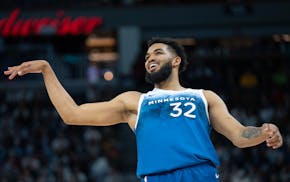Editor's note: This column appeared in the Star Tribune on August 20, 2005.
Jim Grant walked into the home clubhouse at Cleveland's Municipal Stadium. He went to his locker, and it was empty.
"I asked the clubhouse guy, `Did you change my locker?'-" Grant said. "And he said, `We were told to take your stuff to the other clubhouse.'-"
That's how Grant found out on June 15, 1964, that he had been traded to the Twins. On the litany of best trades in team history, the acquisition of Grant rates No. 1 for three reasons:
One, what the Twins gave up to get him (pitcher Lee Stange and infielder George Banks); two, what they received in return (catcher John Roseboro and pitchers Ron Perranoski and Bob Miller) when they traded him with shortstop Zoilo Versalles in November 1967 to the Dodgers; and three, what happened while he was here - a trip to the World Series in 1965.
This was in an era when the postseason was the World Series. There were no October flukes. Only teams that received big years from multiple players got a shot.
For the `65 Twins, the biggest year belonged to Jim (Mudcat) Grant, a pitcher who was solid for most of his 14-season career and sensational in that glorious Minnesota summer.
It was a season that started ignominiously for all, with the record floods in Minnesota, and for Mudcat, with a flood of runs in his first two starts - 11 hits, eight runs in 3 1/3 innings. It ended with 21 victories, six shutouts, 270 1/3 innings and 14 complete games.
Why not a Cy Young Award? There was only one for both leagues in 1965. It was hard to argue with the baseball writers' choice: the Dodgers' Sandy Koufax, who went 26-8 with 27 complete games, eight shutouts and 382 strikeouts.
Koufax also beat the Twins 2-0 in the seventh game of the Series.
It was Grant who got his team that far, beating the Dodgers 5-1 in Game 6.
Ask anyone who was in Met Stadium's left field bleachers that day: Mudcat lofting his three-run home run amongst us in the sixth inning was the spectating thrill of a lifetime.
"There was magic to that season - for me, and more for my team," Grant said Friday.
For Mudcat, the magic might have started when the Twins hired Johnny Sain as their pitching coach after the 1964 season.
"Johnny was the best thing that ever happened to me," Grant said. "He talked movement and changing speeds. What all the pitching coaches emphasize today, that was Sain 40 years ago.
"He had this gizmo, a ball that spun on a rod. You kept putting your fingers on the ball, spinning it as though you were gripping and throwing a pitch. You did that in the dugout, took it home with you. The idea was to teach you to release the ball so that it had more movement."
The Twins were near the end of spring training in 1965. "I was in the bullpen and threw a fastball that moved down and in," Grant said. "I changed the grip a little, and it moved down and away.
"I hollered at Sain in the dugout: `Johnny, get down here. You have to see this.' I threw about two of those sinkers for him, and he said, `You got it.'-"
Grant arrived in the Twin Cities on Friday for the 40th reunion of the `65 Twins. He and wife Trudy came in from Europe, where they had spent three weeks visiting her family in Austria. Mudcat and Trudy first met in 1957, when he was pitching in the Pacific Coast League and she was visiting a friend in Los Angeles.
"The Cleveland Indians warned Mudcat that it wasn't a good idea," Trudy said. "Years later, we got back together."
Black man, white woman - that's what wasn't a good idea in the view of big-league baseball teams in the late `50s.
"It's all in the book," Mudcat said. "-`Twelve Black Aces.' I've written it with a New York writer, Tom Sabellico. There only have been 12 African-American pitchers to win 20 games. There are stories about all of them, tied in with my story."
Grant's baseball story was almost very short. He was an 18-year-old from the Florida outback when he was invited to Cleveland's camp for bottom-rung minor leaguers in 1954. He was an infielder ready to be sent back home after two weeks.
"Then, Red Ruffing, the minor league pitching coach, said, `Tell `em you can pitch,'" Grant said. "So, when Red's boss came to cut me, I said, `Too bad you never got a chance to see me pitch.' "Teams always want pitching. He told me I could pitch in a little intrasquad game that afternoon."
Ruffing and Spud Chandler, another coach, took Grant into a bathroom - out of everyone's sight - and showed this pitching novice the fundamentals of the delivery. And they also ordered him to throw his first pitch under the chin of the batter.
He was an unfortunate Class AA player named Johnson. Grant's first pitch sent him sprawling in the dirt.
"The rest of the hitters didn't want any part of me after that," Mudcat said. "I struck out 12 in seven innings, something like that. The rest is history."
Real history. First black pitcher to win 20 games in organized baseball (21-5 for Fargo in the Northern League in 1954), followed by being the first black pitcher in the American League to win 20 games and a World Series game.
Happened in `65. For the Twins. You can read all about it.
"`Twelve Black Aces,'" Grant said. "Coming in October."
World Series time?
"Right," said Mudcat, with a wink.
Career year
Jim (Mudcat) Grant had career highs in victories (21), complete games (14), shutouts (six) and innings pitched (270 1/3) during the Twins' 1965 AL championship season. Grant also led the Twins staff in each of those categories. A look at Grant's career:
1965 stats: 21-7 with 3.30 ERA in 41 games.
Career stats: 145-119 with 3.63 ERA in 571 games (14 seasons).
Coming: Traded by Cleveland on June 15, 1964, to Twins for pitcher Lee Stange and infielder George Banks in one of the best trades in Twins history.
Going: Traded by Twins on Nov. 28, 1967, along with Zoilo Versalles to Dodgers for catcher John Roseboro and pitchers Ron Perranoski and Bob Miller.
Traveling man: Pitched for Cleveland (1958-64) and Twins (1964-67), then between 1968 and `71 pitched for Dodgers, Montreal, St. Louis, Oakland (twice) and Pittsburgh.

Reusse: Wolves need stopper for Booker? NAW, it's not a problem.

Reusse: Success on court helped Timberwolves do strong business

Reusse: Taylor's story. 'I just bought the Minnesota Timberwolves.'

Reusse: Back from injury, Towns doesn't have to carry load


